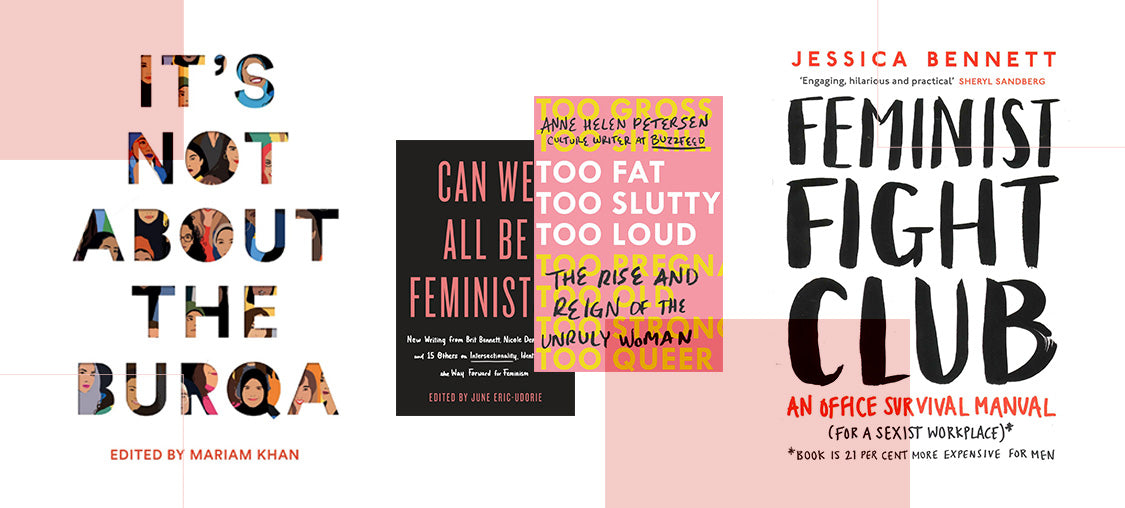Journal
11 Intersectional Books to add to your Feminist Reading List by Jenessa Williams

I can’t be the only one who put ‘read more books’ at the top of my News Years Resolutions list. As a Postgrad student, I do already read plenty, but it is barely exclusively for pleasure, and often, I find myself craving a little more time and space to read things that are written in plain sentences and don’t come with 15 references to quote.
Still, I believe that reading can be educational, introspective AND emotional all at the same time, and the market for feminist reading is absolutely booming. With that in mind, here are 11 books that I think are worth skipping Netflix for the night. Written by an array of diverse, smart women, they are proof that feminism doesn’t have to be wrapped up in academic prose – shock, it can even be FUN.
Can We All Be Feminists? Edited by June Eric- Udorie
I wish I had half the eloquence that June has when I was her age. A journalist and feminist campaigner, she’s put together this anthology at just 20 years old, featuring seventeen short essays that speak of the importance of a feminism that acknowledges racism, ableism, homophobia, trans rights and more. An eye-opening read that brings about conversations of privilege without the guilt trip.
Feminist Fight Club by Jessica Bennett
For anybody battling against a sexist boss or looking for a way to break through a company’s glass ceiling, this book is absolutely invaluable. I learnt so much about ways to present myself, ways to ask for a raise and ways to say no – all without being a bitch, but rather an assertive, confident version of myself that is entitled to everything I’ve worked hard for. Full of practical advice, no female’s library should be without a copy.
When Chickenheads Come Home To Roost: A Hip-Hop Feminist Breaks It Down by Joan Morgan
It’s no joke to say that Joan Morgan’s work changed my life. As somebody who passionately cares about women’s’ rights but also likes to get down to a Drake song at the weekend, I’d always felt guilty about the confliction of values that being a hip-hop fan arose within me. This book manages to talk about these issues in a fun and engaging way, demonstrating that there is a significant social history to be considered in hip-hop (especially for black women), and feminism isn’t always black and white, nor does it have to be. A proper game-changer!

Too Fat, Too Slutty, Too Loud: The Rise and Reign of the Unruly Woman by Anne Helen Petersen
A cultural critic and buzzfeed witer, Anne Helen Petersen is well placed to discuss 11 celebrity women and explore how and why society has deemed them ‘too much’ – from Serena Williams and Kim Kardashian to Hilary Clinton. A couple of chapters may be a little eye-rolling (ahem, Lena Dunham), but the wider message is an important one – in this world, you will always be too much for some people, but that should never stop you striving for your own version of success.
Sex Workers Unite: A History of the Movement from Stonewall to SlutWalk by Melinda Chateauvert
More of a history book, but a very important one nonetheless – this is the book to shove in the face of everybody who insists that women cannot be liberated if they also happen to enjoy their sexuality. From pole dancers to legalised prostitutes, this is the first book I’ve seen give these women a voice, one they deserve just as much as anybody else.
On Intersectionality: Essential Writings – Kimberle Crenshaw
Not sure what intersectionality actually means? We’re all still learning, but as the woman who coined the term, Kimberle Crenshaw’s text is a great place to start. 2019 will see the re-print of this seminal book with new chapters that break down racial justice, gender equity and social identity in an easy-to-understand way. Add it to your pre-order list now.

The Beauty Myth by Naomi Wolf
Initially published in 1991, many of the beauty myth’s lessons still ring true today. In this book, Wolf condemns the beauty industry and it’s relentless attempts to make us feel inadequate without the latest must-have products, exploring real-life examples that infiltrate our media, our home lives and often, between women themselves. Although some parts may feel a little dated, the essence of this book rings true, and will certainly make you think twice about our modern ‘influencer’ culture.
It’s Not About The Burqa: Muslim Women on Faith, Feminism, Sexuality & Race – Mariam Khan
The clues are in the title – this upcoming 2019 read tackles a proportion of society so often maligned in the media as being repressive, with no understanding of what it means to be a Muslim AND a Millennial. A mix of British and American voices, essays include topics such as arranged marriage, queer identity and dealing with racism, all while trying to get by as a woman. I can’t wait for this one.
Brave – Rose McGowan
A woman at the forefront of the #MeToo movement, Rose McGowan has been to hell and back and tells it all in her memoir about reclaiming her life in the wake of trauma. Exploring childhood stardom, systematic misogyny and the important of activism, this is a book that makes you want to take to the streets and do something – times up indeed.

Text me when you get home by Kayleen Scaefer
I’m only halfway through this one after receiving it as a Christmas gift, but I already know that it’s something I’d happily pass on to a friend. A celebration of female friendship, it’s not a feminist book so much as a relationships one, and a reminder that a strong woman is one who surrounds herself with other strong women, encouraging and elevating their success as much as they strive for their own. Warning: you may want to call your best friend after every chapter.
Eat Up – Ruby Tandoh
Eat Up may seem like an odd choice for a feminist reading list, but in a world that continuously scrutinizes our bodies and everything we put in them, Ruby Tandoh’s book is a surprisingly liberating one that should provide some comfort to anyone who has struggled with diet as a way to try and conform to unrealistic beauty standards. Championing food as a means of exploring cultures, bringing people together and enjoying self-care, Ruby writes in such a glorious, visual way that it’s hard not to keep turning the pages – I for one will never under-appreciate a Creme Egg again.



